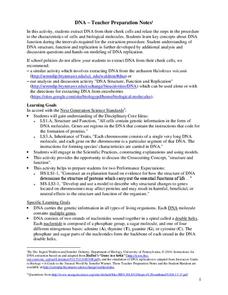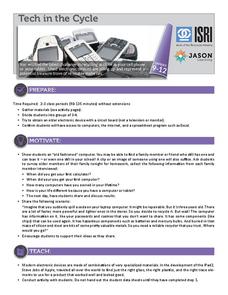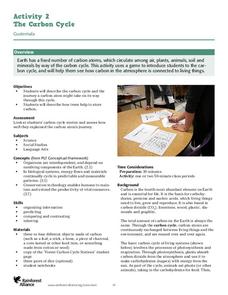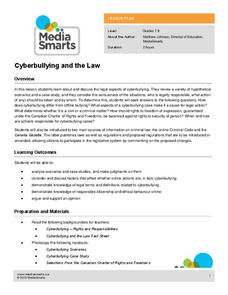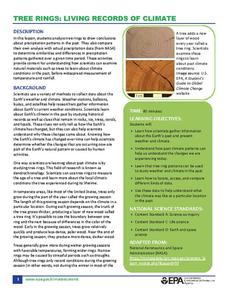Curated OER
Extracting DNA from Your Cells - Teacher Preparation Notes
Students extract their own DNA from cheek cells. In this biology instructional activity, students explain the replication process. They identify the structure and composition of DNA.
Jason Learning
Tech in the Cycle
It might not be easy, but it is worth recycling electronics. Small groups determine the percentage of the materials that make up an iPad 2 and display the information in a circle graph. They then research the recycling process for...
Rainforest Alliance
The Carbon Cycle
Scholars learn about the carbon cycle, play a carbon cycle game, and then write a story based on their role as a carbon atom during the game. After the writings, pupils analyze the carbon cycle by leading a class discussion on the material.
Rainforest Alliance
Investments in Forest Carbon
One hundred metric tons of CO2 can accumulate in one acre of forest over time—that's a lot of carbon! In the activity, groups of middle school learners determine what makes forests important. They then solidify the concept by using a...
University of Texas
Lives of Stars
Stars exist from a few million years to over 10 billion years, depending on their mass. Scholars perform a play acting as stars to learn about their different life cycles. They develop an understanding of many of the fundamental concepts...
Radford University
The Science of Surveys
To drill or not to drill? An informative unit has scholars first research the advantages and disadvantages of oil drilling in Alaska. They set up and conduct a sample survey to assess attitudes toward oil drilling in a specific...
Radford University
Midsummer Classic’s Homerun Derby
Hit a home run with your lessons. A two-part activity has learners explore quadratic equations that model the path of a baseball. They see how changing the initial speed of the ball affects its maximum height, maximum horizontal...
Radford University
Let's Buy a Car
Ready to buy a car? Learners research different makes and models of cars to decide on the best one to buy. They collect data on cost, fuel efficiency, safety ratings, and insurance costs, then create and analyze data displays to make...
Children’s Hospital of Philadelphia
Organs and Tissues of the Immune System
It's virus-fighting time! Pupils learn how viruses attack and reproduce and how the immune system works to protect the body. They identify unfamiliar terms and tissues and organs of the immune system. Working in small groups, scholars...
Children’s Hospital of Philadelphia
Vaccine Safety
Enter the debate on vaccines. Small groups research topics related to vaccine safety in the last lesson in a unit of five. In the process of the research, team members learn how to determine the validity and credibility of a website. The...
Children’s Hospital of Philadelphia
Learning From Animals
Is all research on animals bad? Learners use a video to understand how animal research benefits humans. Pupils read about a drug modification turned deadly and the result of the 1938 Federal Food, Drug, and Cosmetic Act. Scholars use a...
Bonneville
Unique Solar Cell Model Sketch and Presentation
There's always room for improvement. Continuing from the previous lesson, learners first create a two- or three-dimensional model of their solar cell designs. They then give short presentations to the rest of the class and receive...
Bonneville
Illuminate Me: Merging Conductive Sewing, Technology, and Solar Power
Sew up a unit on solar energy with a hands-on project. Groups sew LED lights on clothing using conductive thread. Solar modules attached to a helmet provide the energy for the lights. A final presentation gives learners the opportunity...
Media Smarts
Cyberbullying and the Law
Dealing with the very topical subject of cyberbullying, this lesson plan will surely create some engaged discussion in your classroom. Young learners discuss the laws concerning cyberbullying in Canada, and then respond to a series of...
Wild BC
Is Climate Change Good for Us?
Is it really that big of a deal if the global climate undergoes a little change? Young environmentalists consider this very question as they discuss in small groups the impact of different climate change scenarios on their lives, their...
Curated OER
Water in Earth's Hydrosphere
Environmentalists test stream water for temperature, pH, and turbidity. Each group shares their information and then the class makes an overall evaluation of the water quality. A slide show sets the backdrop for the teaching portion and...
US Environmental Protection Agency
Tree Rings: Living Records of Climate
Open with a discussion on weather and climate and then explain how tree rings can provide scientists with information about the earth's past climate. Pupils analyze graphics of simulated tree rings from various US locations for the...
Curriculum Corner
“I Can” Common Core! 3rd Grade Math
Help third graders make sense of the Common Core math standards with this simple checklist. By rewording each standard as an I can statement, children are provided with clear goals to focus on as they participate in math lessons.
Curriculum Corner
“I Can” Common Core! 3rd Grade Writing
Present third grade writers with clear learning objectives using this Common Core checklist. By phrasing each standard as I can statements, this document serves as an excellent resource for helping children further develop their writing...
Rain Bird Corporation
Rain Forest Teaching Curriculum
Take young naturalists on an exploration of the world's tropical rainforests with this extensive collection of lessons and activities. Whether its creating leaf and flower prints or investigating the absorption spectrum of chlorophyl,...
Curated OER
Grammar Lesson Plan: Simple Past vs. Present Perfect
What's the difference between the present perfect and simple past? Have your class practice identifying and using both of these verb tenses through pair activities, whole-class discussion, and a worksheet.
California Academy of Science
Carbon Cycle Role-Play
A role-play activity that uses Ping-Pong balls to represent carbon atoms demonstrates for young scientists the complex relationships involved in the carbon cycle.
Ask a Biologist
It’s a Plankton Eat Plankton World
For as small as they are, plankton sure play an enormous role in maintaining marine ecosystems. Dive into an investigation of these tiny organisms with a hands-on life science activity in which children cut out pictures of sea animals...
Rock A Lingua
Medios de Transporte/Means of Transportation
Make sure your pupils know how to get where they want to go! Learners can practice their Spanish vocabulary by completing these worksheets, which focus on modes of transportation and some grammar phrases for expressing going from one...


